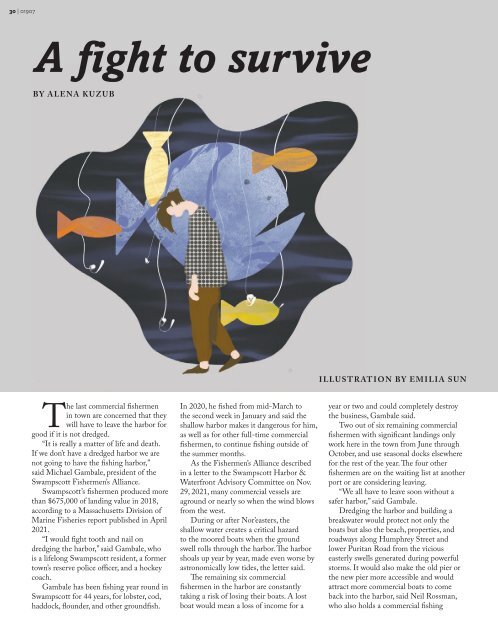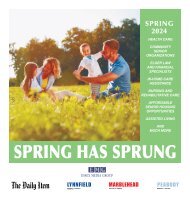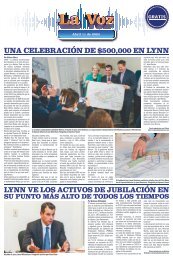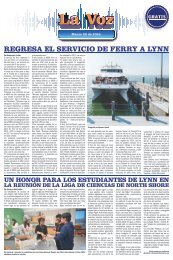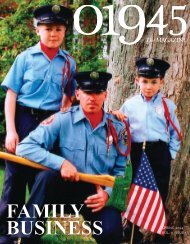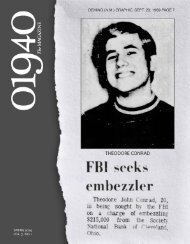01907 Summer 2022
You also want an ePaper? Increase the reach of your titles
YUMPU automatically turns print PDFs into web optimized ePapers that Google loves.
30 | <strong>01907</strong> SUMMER <strong>2022</strong> | 31<br />
A fight to survive<br />
BY ALENA KUZUB<br />
The last commercial fishermen<br />
in town are concerned that they<br />
will have to leave the harbor for<br />
good if it is not dredged.<br />
“It is really a matter of life and death.<br />
If we don’t have a dredged harbor we are<br />
not going to have the fishing harbor,”<br />
said Michael Gambale, president of the<br />
Swampscott Fishermen’s Alliance.<br />
Swampscott’s fishermen produced more<br />
than $675,000 of landing value in 2018,<br />
according to a Massachusetts Division of<br />
Marine Fisheries report published in April<br />
2021.<br />
“I would fight tooth and nail on<br />
dredging the harbor,” said Gambale, who<br />
is a lifelong Swampscott resident, a former<br />
town’s reserve police officer, and a hockey<br />
coach.<br />
Gambale has been fishing year round in<br />
Swampscott for 44 years, for lobster, cod,<br />
haddock, flounder, and other groundfish.<br />
In 2020, he fished from mid-March to<br />
the second week in January and said the<br />
shallow harbor makes it dangerous for him,<br />
as well as for other full-time commercial<br />
fishermen, to continue fishing outside of<br />
the summer months.<br />
As the Fishermen’s Alliance described<br />
in a letter to the Swampscott Harbor &<br />
Waterfront Advisory Committee on Nov.<br />
29, 2021, many commercial vessels are<br />
aground or nearly so when the wind blows<br />
from the west.<br />
During or after Nor’easters, the<br />
shallow water creates a critical hazard<br />
to the moored boats when the ground<br />
swell rolls through the harbor. The harbor<br />
shoals up year by year, made even worse by<br />
astronomically low tides, the letter said.<br />
The remaining six commercial<br />
fishermen in the harbor are constantly<br />
taking a risk of losing their boats. A lost<br />
boat would mean a loss of income for a<br />
ILLUSTRATION BY EMILIA SUN<br />
year or two and could completely destroy<br />
the business, Gambale said.<br />
Two out of six remaining commercial<br />
fishermen with significant landings only<br />
work here in the town from June through<br />
October, and use seasonal docks elsewhere<br />
for the rest of the year. The four other<br />
fishermen are on the waiting list at another<br />
port or are considering leaving.<br />
“We all have to leave soon without a<br />
safer harbor,” said Gambale.<br />
Dredging the harbor and building a<br />
breakwater would protect not only the<br />
boats but also the beach, properties, and<br />
roadways along Humphrey Street and<br />
lower Puritan Road from the vicious<br />
easterly swells generated during powerful<br />
storms. It would also make the old pier or<br />
the new pier more accessible and would<br />
attract more commercial boats to come<br />
back into the harbor, said Neil Rossman,<br />
who also holds a commercial fishing<br />
Michael Gambale, left, president of the Swampscott Fishermen’s Alliance, and Paul Whitten are two of the six commercial fishermen still working out of<br />
Swampscott's harbor.<br />
PHOTO: ALENA KUZUB<br />
license and is a member of the Fishermen’s<br />
Alliance, but has moved his boat out of<br />
Swampscott.<br />
“Building a new pier or refurbishing the<br />
old one won’t help commercial fishermen<br />
one bit,” said Rossman. “Don’t say you are<br />
doing it to help the commercial fishermen.”<br />
If the new pier is built primarily with<br />
leisure in mind, it will adversely affect<br />
the parking situation, which is already<br />
complicated, the fishermen said.<br />
The Fishermen’s Alliance wants to save<br />
commercial fishing because of its historical<br />
importance to Swampscott. In his book<br />
“Gleanings From The Sea,” which was first<br />
published in 1887, Joseph Warren Smith<br />
wrote that Swampscott used to be the main<br />
fish market prior to 1840, where many fish<br />
were brought in and as many as 50 to 100<br />
vehicles from Boston to Canada would line<br />
up to purchase seafood.<br />
In the 1950s-70s, Fisherman’s Beach<br />
was covered in drying reels for nets, boats<br />
being built, and dories, said Rossman. At<br />
the height of modern fishing, Swampscott<br />
harbor had about 30 full-time commercial<br />
fishermen.<br />
Swampscott is famous for its doubleended<br />
dories and lobster traps that were<br />
invented in the town, not to mention Capt.<br />
James Phillips, who is depicted on the<br />
town’s seal.<br />
“We have more heritage and more<br />
history here than probably any of the<br />
harbors,” said Gambale. “Fishing is a<br />
handed-down tradition in Swampscott.”<br />
Another commercial fisherman,<br />
Paul Whitten, said he grew up in the<br />
Swampscott harbor.<br />
“My father lobstered and tuna-fished,<br />
and striped-fished,” said Whitten. “There<br />
are pictures of my grandfather in the locker<br />
in the Fish House, pictures of me making<br />
nets and building oak lobster traps.”<br />
Whitten has recently bought a new<br />
boat and was considering relocating it to<br />
Beverly, which would definitely be safer,<br />
he said.<br />
But moving to another harbor has<br />
its own challenges. It is not easy to get a<br />
mooring spot as many harbors have waiting<br />
lists. Fishermen would have to let go of<br />
fishing in the Swampscott fishing grounds,<br />
but commercial fishing is very territorial<br />
and competitive, Gambale said.<br />
“If I move my whole operation over to<br />
Gloucester, I am not steaming an hour and<br />
a half back to Swampscott. Now I got to<br />
fish new grounds and make good with the<br />
guys in those areas,” said Whitten.<br />
The fishermen understand the fiscal<br />
issue with dredging. Replanting eelgrass<br />
habitat, required by the state, would<br />
make it expensive. But they wonder how<br />
much more expensive that would be than<br />
building a new pier that does not help<br />
them in any way.<br />
“Do you want Swampscott to maintain<br />
the fishing community?” is what Gambale<br />
would like to ask the town and the state.<br />
According to him, at least three to four<br />
fishermen would come back if the town<br />
makes the harbor safe.<br />
Gambale, 68, said that he is planning<br />
to fish for as long as he can, probably into<br />
his 80s.<br />
“And I will, with or without this pier<br />
and dredging; I’ll fish for the remainder<br />
of my career,” Gambale said. “I am here<br />
because I would like to see this harbor<br />
maintained the way it’s been since the<br />
beginning of time.”<br />
He would hate to throw in a towel<br />
because some highschool kid might be<br />
considering being a fisherman and wants to<br />
fish from Swampscott, Gambale said.<br />
“I would hate to see it all gone and<br />
that is why I am such an advocate for the<br />
dredging project. It is literally going to be<br />
the end of an era if it doesn’t get done,”<br />
Gambale said.


